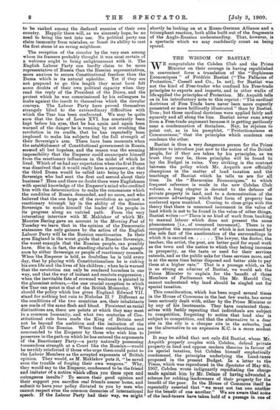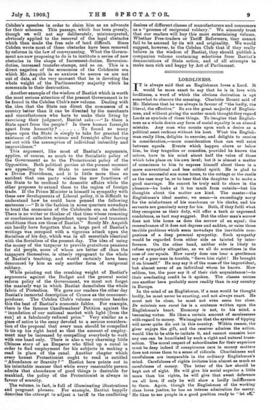THE WISDOM OF BASTIAT.
-WE congratulate the Cobden Club and the Prime Minister on their courage in having republished in convenient form a translation of the " Sophismes Economiques " of Frederic Bastiat (" The Fallacies of Protection," Cassell and Co., is. net), for Bastiat was not the kind of Free-trader who confined his Free-trade principles to exports and imports, and in other walks of life applied the principles of Protection. Mr. .Asquith tells us in his introductory note to this reprint : "The cardinal doctrines of Free Trade have never been more cogently presented or more brilliantly illustrated" than by Bastiat. True ; but those cardinal doctrines were applied fairly and squarely and all along the line. Bastiat never runs away from a Free-trade argument because it is getting perilously near a condemnation of Socialism. Nay, be rejoices to point out, as in his pamphlet, " Protectionuisme et Communisine," that the principles which condemn one condemn the other.
Bastiat is thus a very dangerous person for the Prime Minister to introduce just now to the notice of the British people, for if they are taken by his principles, as we trust they may be, those principles will be found to lay the Budget in ruins. Very striking is the contrast between the policy which Mr. Asquith now officially champions in the matter of laud taxation and the teachings of Bastiat which he tells us are for all time. In the "Harmonies Economiques," to which frequent reference is made in the new 'Cobden Club volume, a long chapter is devoted to the defence of private property in land, and to a demonstration of the enormous advantages which that form of property has conferred upon mankind. Coming to close grips with the theory that there is unearned increment in the value of land which is not to be found in the value of other things, Bastiat writes :—" There is no kind of work from banking to manual labour which does not present the same phenomenon [i.e., of unearned increment]. There is no occupation the remuneration of which is not increased by the sole fact of the amelioration of the surroundings in which it is carried on The lawyer, the doctor, the teacher, the artist, the poet, are better paid for equal work as the town and the nation to which they belong increase in prosperity, as the taste or need for their services extends, and as the public asks for these services more, and is at the same time better disposed and better able to pay them at a higher rate." That is a passage which, as he is so strong an admirer of Bastiat, we would ask the Prime Minister to explain for the benefit of those Members of Parliament who, like Mr. Harold Cox; cannot understand why laud should be singled out for special taxation.
This consideration, which has been urged several times in the House of Commons in the last few weeks, has never been seriously dealt with, either by the Prime Minister or by any of his lieutenants. They have contented them- selves with feebly repeating that individuals are subject to competition, forgetting to notice that land also is subject to competition, and that the alternative to a dear site in the city is a cheaper site in the suburbs, just as the alternative to an expensive K.C. is a more modest junior.
It may be added that not only did Bastiat, whom N. Asquith properly couples with Cobden, defend private property in land and oppose modern theories in favour of its special taxation, but Cobden himself emphatically condemned, the principles underlying the Land-taxes proposed in the present Budget. In a letter to the Times, which was reproduced in the Spectator of May 4th, 1907, Cobden wrote indignantly repudiating the charge made against him by Mr. Delane of having advocated a scheme for robbing landowners of their property for the benefit of the poor. In the House of Commons itself he repeatedly asserted that "we must not tax one another for the benefit of one another." We are aware that *some of the land-taxers have taken hold of a passage in one of Cobden's speeches in order to claim him as an advocate for their schemes. This passage, which has been grossly, though we will not say deliberately, misinterpreted, obviously applied to the removal of the legal obstacles which then made the free sale of land difficult. Since Cobden wrote most of these obstacles have been removed by reforms in the law of conveyancing. What the Govern- ment are now proposing to do is to institute a series of new obstacles in the shape of Increment-duties, Reversion.
duties, increased transfer-stamps, and so on. This is a direct negation of the economics of the Cobdenite era which Mr. Asquith is so anxious to assure us are not out of date, at the very moment that he is devoting the whole weight of the Parliamentary majority which he commands to their destruction.
Another example of the wisdom of Bastiat which is worth the most serious attention of the present Government is to be found in the Cobden Club's new volume. Dealing with the idea that the State can direct the commerce of a country better than it can be directed by the merchants and manufacturers who have to make their living by exercising their judgment, Bastiat asks :—" Is there a State apart from the people ? Is there human foresight apart from humanity? To found so many hopes upon the State is simply to take for granted the existence of collective science and foresight after having set out with the assumption of individual imbecility and improvidence."
This argument, like most of Bastiat's arguments, applies, of course, as much to the Socialistic policy of the Government as to the Protectionist policy of the Opposition. Both political parties at the present moment are appealing to the State to assume the role of a Divine Providence, and it is little more than an accident that one party wishes the new functions of the State to be confined to domestic affairs while the other proposes to extend them to the region of foreign trade. If the Prime Minister is himself in sympathy with these new developments of Liberal policy, it is difficult to understand how lie could have penned the following sentences :—" It is the fashion in some quarters nowadays to treat the economics of the Cobdenite era as obsolete.
There is no writer or thinker of that time whose reasoning or conclusions are less dependent upon local and transient conditions than are those of Bastiat." Surely Mr. Asquith can hardly have forgotten that a large part of Bastiat's Writings was occupied with a vigorous attack upon the Socialism of his day, which was in all essentials identical with the Socialism of the present day. The idea of using the money of the taxpayer to provide gratuitous pensions for old 'people, some of whom are better off than the taxpayers themselves, is utterly repugnant to the whole of Bastiat's teaching, and would certainly have been denounced by him as only another form of reciprocal robbery.
While pointing out the crushing weight of Bastiat's arguments against the Budget and the general social reform policy of the Government, we must not forget the masterly way in which Bastiat demolishes the whole fabric of Protection. We gave our readers the other day Bastiat's immortal description of Crusoe as the consumer- producer. The Cobden Club's volume contains besides this the best of Bastiat's economic fables. For example, there is the famous Candlemakers' Petition against the
"inundation of our national market with light [from the sun] at a fabulously reduced price." Very similar as a piece of satire is the essay devoted to a serious considera- tion of the proposal that every man should be compelled to tie up his right hand so that the amount of employ- ment may be increased by compelling everybody to work with one hand only. There is also a very charming little Chinese story of an Emperor who filled up a canal in
order to find employment for his subjects in making a road in place of the canal. Another chapter which every honest Protectionist ought to read is entitled "Abundance or Scarcity ? " Bastiat here points out in his inimitable manner that while every reasonable person admiti that abundance of good things is desirable for mankind, the policy of the Protectionist is always in favour of scarcity.
The volume, in fact, is full of illuminating illustrations and pregnant phrases. For example, Bastiat happily describes the attempt to adjust a tariff to the conflicting desires of different classes of manufacturers and consumers as a "process of reciprocal robbery." We sincerely trust that our readers will buy this most entertaining volume. Whether Free-traders or Tariff Reformers, they cannot fail to be amused by its wit and originality. We would suggest, however, to the Cobden Club that if they really believe in the wisdom of Bastiat, they should publish a companion volume containing selections from Bastiat's denunciations of State action, and of all attempts to make men rich and happy by Act of Parliament.















































 Previous page
Previous page